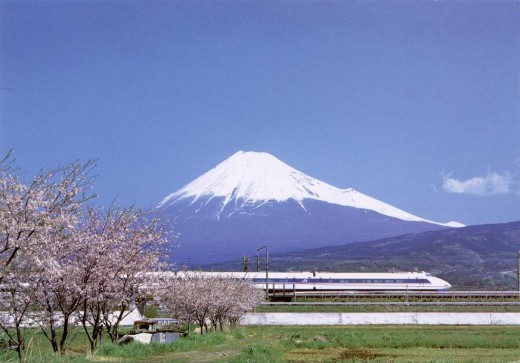Ten Ways to Make Japan a Better Place

Japan is a great country--but if you have been living there for a number of years, like any long-term resident of a place you begin to see the ways it could be improved. I see a country that is on the verge of change but is hesitant to actually make a move. There are many problems that plague the country--an aging population, a stagnant economy, proximity to tensions on the Korean Peninsula--and there is very little time available to resolve these problems before it is too late. I for one do not want to see Japan fade as a respected and respectable country. I would like to see it flourish and lead in the 21st century.
But in order to get beyond all these problems, there needs to be a vision--a vision of a country that is better than it is now and perhaps better than it ever has been--a vision of a country that will be looked upon with envy by the rest of the world. As somebody who has lived both inside and outside the country, I have come up with my little list of how things could be . . better!
1. Allow Dual Citizenship
This is kind of a personal topic for me, since I have an American father and Japanese mother. I used to have both citizenships, but as someone over the age of 21, I was forced to choose one or the other country as my sole country. I chose America. If it had been up to me, I would have kept both citizenships. However, Japan is one of the few countries in the world that does not allow dual citizenship.
Japanese are pretty black-and-white about many things, and citizenship is one thing they are definitely set in their ways about. You can only have one mother country, and that is that. But in an increasingly globalized world, and in a country where the home population will soon be decreasing, would it not be time to open up the doors a little? And if they are going to open the doors on diversity, I think it would make sense to accept those who are closest to the native race first--the people of mixed ancestry. Many mixed Japanese tend to speak more than one language, and are open-minded. They would no doubt add dimension to Japan's skill set and also help create ties with other countries.
So called "haafu" may choose Japanese citizenship if they like, but will not do so because they are not accepted as Japanese anyway. I think it is time to embrace them as a part of the Japanese identity.
2. Better City Planning
Japan, just like China and Korea, used to have very orderly city planning. Ancient Chinese cities were the model for Kyoto and Edo (old Tokyo). These cities were well-organized, usually oriented North-South, with straight streets and various wards to section off cities. As a matter of course, the dynamics of the roads and buildings were taken into account so that there could be the best flow of "chi" or "energy" possible. If you look at a modern-day Japanese city, you would think that there is horrible flow of "chi." In fact there seems to be little if any "planning" on the part of the government at all.
What happened? With modernization in the late 1800's, Japan's cities grew at a rapid rate. The model for Japan's cities became those of the west. But though western architecture became prevalent in Japan's cities, the importance was placed on technology and style instead of overall planning. After world war two, Japan's cities were devastated by bombing and cities were rebuilt haphazardly. In the modern era, public planning and construction are closely tied to politics and have become a way for Japan's labor force employed. The result is less-than-elegant city planning. There is no easy solution to this problem, especially since long-term projects are required. But I think that first of all construction needs to be separated from politics, and as cities like Tokyo continue to grow, the government should think about creating more pleasant environments in the city.
3. More community
If you go into the countryside in Japan and ask the local people what is the most important ingredient to overall happiness, they will most likely tell you it is kizuna, or "community ties." Based on an agricultural economy, the bonds that held people together used to be a way to create a collaborative work force. Town festivals involved people of all ages, male and female, and gave people a sense of place. Now, in cities like Tokyo you find a fractured society where hikikomori are too afraid of their fellow man to even go outside and interact with people. There should be more community events that involve people and reinforce the traditions of Japan. The power of kizuna is out there, it just has to be tapped into!
4. An open mind
If this sounds vague, let me apologize. What I am trying to point out is a very specific frame of mind--something that at the moment is not part of the "national mindset." Japan has often seen itself in comparison to other countries in an "us and them" attitutde, so much so that for a great part of its history it closed itself off from the rest of the world. I agree that this has given Japan its unique sense of identity and sophisticated societal structures. But the problem is that this kind of mindset does not allow a nation to stay afloat in rapidly changing times.
As it has often done in times of crisis, Japan must observe what is going on in the world around it, and consider the best way moving forward. This means keeping eyes and ears tuned to discussions that are going on in the rest of the world and reassessing its own position. Too often Japan finds itself in the defensive position, hanging on to archaic notions to maintain its identity. The way forward is to stimulate discussions both inside and outside the country to create new ideas. A period of history where this kind of "active" discussion was prevalent was during the Meiji Era. Great thinkers like Ryoma Sakamoto (who had a very open mind) paved the way to a new era.
5. Better PR
As the originator of manga and anime, Japan has attracted many visitors and built its "soft power." I myself grew up on manga and I think there are a lot of fabulous and educational stories contained in this medium. But should it really be used for PR purposes? Should manga and anime, a great bulk of which is pornographic and violent, be used by the government to promote the country?
The Aso government started such programs as part of a PR campaign. However, I think it is silly to send "culture ambassadors" like pop idols and French maids to promote Japan as a country and culture. There is so much to the country, from tea ceremony to martial arts, that is much more refined and has something to teach about life. I understand that the government is trying to ride on the popularity of these particular media, but perhaps it should think about how Japan's image will be affected in the long-run.
In addition, much of the global concerns with Japan revolve around Japan's fishing industry. There have been flare-ups over dolphin-killing and whale hunting. Japanese defensiveness and an unwillingness to open up discussion about these issues have only aggravated the problems. Instead of being insecure and lashing out, Japan should make a better effort to open up dialogue and resolve these issues.
6. Shake up the celebrity world
Japan's entertainment industry reached its peak in the 1980's, when celebrities like Beat Takeshi (Takeshi Kitano) rode on Japan's economic boom times. They had big budgets and big audiences to produce television extravaganzas. This is also when the system of "jimusho" or agencies like Johnny's crystallized and established their power. The problem is that while the budgets and audiences have shrank (as the economy whithered and people turned to the internet or video games) the structures have remained in place. What you now have is barely talented tarento spending their days in the television studios playing games. If celebrities, including musicians, represent the kind of lives that people want to live, they need to be more exciting, and talented. I think that we need to see the agencies make way for more creative and talented people who will bring a new age to the Japanese entertainment industry.
Personally, I want to see the music industry opened up so that there are better-talented musicians who are not engineered by agencies. This means that fans, too, must be better educated in good music and fresh ideas.
7. Make less trash
A Japanese word, mottainai, which means "it's a waste" is often used these days to promote environmental campaigns. But there is one very mottainai element to Japanese society. This is all the packaging that is used for various products. Any time you buy something in Japan, no matter how small it is (for example, one donut) it is enclosed in intricate packaging. Individual cookies are sold in individual bags. There is of course a cultural element to all of this, which is that in Japan the way something is presented is very important to the customer. But considering the state of the world economy and environment, Japan should consider creative ways to get around this problem.
8. Instill a merit-based system in work environments.
People have long spoken of the break down of the nenko-joretsu system in Japan, whereby long-term employees in a company are rewarded by higher salary and position, regardless of talent. It has been traditional to give little credit to individuals for company success, and rather regard the results as a product of everyone's effort. However, Japan's work force is very disillusioned these days, because the security associated with this system is no longer ensured. Many workers are part-time or contract workers who may leave the company in just a few years. Many people float from one company to the next, never able to attain high salaries or benefits.
Unless individuals are given a chance to prove themselves and receive reward for individual accomplishments, Japan will be left with a highly unmotivated workforce. This is a serious issue. Respect for the elderly or more experienced can be maintained while those who are young and ambitious rewarded. Some companies have taken to more of a merit-based system, but there are many that are still reluctant to award individual accomplishment. I am sure that this kind of system will reap great benefits for Japanese companies and organizations.
9. Redefine what it means to be Japanese
If you ask most Japanese people what makes a "Japanese person," they will probably tell you that's easy enough to answer--but they won't give you a concrete answer ("just look and you can tell" is not a good answer). For a long time, the Japanese have insisted that they have a homogenous society--one language, one race, one history. But this is not entirely true. In fact, compared to Koreans (for example), the ethnicity of Japanese people is much more mixed. This is because there were successive waves of immigration to the island from the continent over thousands of years. In addition, the presence of Korean-Japanese, Chinese and more recently westerners makes for a more complicated racial makeup.
What is important for the Japan of the future is to define its people by its values, not its race. I believe there are fundamental Japanese values, such as humility, diligence, and loyalty that should define who the Japanese are. And when considering nationality, perhaps there should be elements like language ability, understanding of Japanese history and culture. In a country that places more importance to race above understanding of culture, this will cause problems when dealing with future immigration. What I envision for the future is a Japan where there are people of various ethnicities who understand Japan and its culture, language and society. This is a surefire way to create a smooth-running society.
10. I know I wrote "top ten ways" but I think I've run out. Overall I love Japan and I think it is a very unique country. It has a long history and it has a lot to offer the world. The Japanese are very into hansei, or "reflection," and they are indeed a very reflective people. Change is always slow to come, but when it does it is overwhelmingly fast and thorough (think Meiji Era). At a time when Japan's position in the world is so tenuous, now is as good a time as any!







